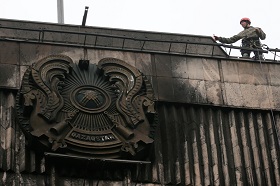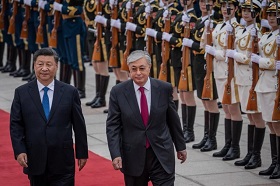Kazakhstan: a key player and a logistic hub for China’s Belt and Road Initiative, a member of the Russia-led Eurasian Economic Union and the Collective Security Treaty Organization (CSTO), the largest country in Central Asia that has practised a multi-vector foreign policy with ease, the most advanced in terms of political and economic reforms among other countries in Central Asia, and often the main avenue for negotiations on important topics on the international agenda.
Yet, Kazakhstan offered an ineffective script for toppling the current regime. Some analysts have sought to explain the latest social upheavals in Kazakhstan by alluding to the narrative of the capitalist and democratic systems that do not fit with the Kazakhstan social fabric and development as a sovereign nation-state. Others have pinned social unrest on the prolonged effects of the COVID-19 pandemic. Various media outlets went as far as to predict a Kazakh version of the Maidan uprising in the Almaty capital, most times with little to no clear evidence.
The social uprising was a rather localised and short-lived one, with events unfolding in two phases: at first, violence, vandalism against government buildings, looting in supermarkets alongside calls for ousting the Nazarbayev family and shortly followed by intense international attention. As a response, the president in office called on the CSTO to intervene with peacekeeping forces. Fears of social uprising spilling over throughout Central Asia are still ill-grounded and may never materialize.
Russia’s waning influence in Central Asia would create a power vacuum that other great powers would aim to fill. Therefore, Kazakhstan is a test case which proves otherwise: Russia is willing to back international military intervention according to the regulations of the Collective Security Treaty Organization (CSTO) — an alliance made up of Russia, Armenia, Belarus, Kazakhstan, Kyrgyzstan and Tajikistan.
The latest extraordinary online meeting of the CSTO to discuss the situation in Kazakhstan and ‘measures to normalise it’ was a tour de force to showcase the unity of the member states in preventing the West from spreading ‘coloured revolutions’ and holding a ‘distinct’ way in terms of values and timely reforms deemed necessary as the ‘situation in Kazakhstan applies to all of us’. The CSTO seems to have taken advantage of the recent events in Kazakhstan to revive itself and push its members to step up their efforts to strengthen solidarity and coordination.
The meeting spurred a program for accelerating integration of the defence policies of the member states with increasing compatibility and interoperability of the military capabilities, training and joined drilling, and proposals to counter destructive foreign interference into the CSTO member states, including cyber interference via the Internet and social media. Further development of a united system of state law enforcement agencies and of the information space was also considered.
The latest events in Kazakhstan bear evidence to the regional character of international relations and the recognition and readiness of a regional hegemon that can order dynamics in between states in the region as well. This will surely create more room to manoeuvre to Russia in the region. On its part, Moscow seems ready to emphasize normal interstate relations to tone down claims of its imperial ambitions in the region. While the West is having hardly any appetite for entanglements in Central Asia considering its failures in Iraq, Syria, Libya, and recently Afghanistan, the rising Rest with the primacy of the Sino-Russian bloc is prone to endure for the coming decades or so.
Kazakhstan: a key player and a logistic hub for China’s Belt and Road Initiative, a member of the Russia-led Eurasian Economic Union and the Collective Security Treaty Organization (CSTO), the largest country in Central Asia that has practised a multi-vector foreign policy with ease, the most advanced in terms of political and economic reforms among other countries in Central Asia, and often the main avenue for negotiations on important topics on the international agenda.
Yet, Kazakhstan offered an ineffective script for toppling the current regime. Some analysts have sought to explain the latest social upheavals in Kazakhstan by alluding to the narrative of the capitalist and democratic systems that do not fit with the Kazakhstan social fabric and development as a sovereign nation-state. Others have pinned social unrest on the prolonged effects of the COVID-19 pandemic. Various media outlets went as far as to predict a Kazakh version of the Maidan uprising in the Almaty capital, most times with little to no clear evidence.
The social uprising was a rather localised and short-lived one, with events unfolding in two phases: at first, violence, vandalism against government buildings, looting in supermarkets alongside calls for ousting the Nazarbayev family and shortly followed by intense international attention. As a response, the president in office called on the CSTO to intervene with peacekeeping forces. Fears of social uprising spilling over throughout Central Asia are still ill-grounded and may never materialize.
Domestic stability in all the Central Asian republics has come with various costs attached. It has legitimised the strengthening of authoritarian regimes, meagre popular opposition has developed, and political elites silently formed clans holding a firm grip to power. However, in the past, social and economic grievances tended to accumulate without much manifested public discontent. One must consider that the republics in Central Asia emerged after the fall of the Soviet Union. While many nation-states in Europe have long traditions and cultures, the peoples of Central Asia are still struggling to enact statehood and overarching national identities.
On the other hand, the strong hand used by government in dealing with the uprising may be a signal of an internal power struggle. This is also suggested by Moscow’s quick and—at the same time—restrained reaction. The CSTO intervention was not aimed against the protesters as it was meant to back up the current president, and, in doing so, it seems to have cemented his position at least for several years to come.
While the popular uprising was driven by discontent with political elites such as Nazarbayev, the so-called “Father of the Nation”, and the current president, the former saw himself ousted by his own appointee. This is a direct indication that Tokayev’s call for CSTO was oriented towards holding tight control against his political rivals rather than fighting against terrorist from the West which would threaten the very sovereignty of Kazakhstan.
Why Russia had to act?
In recent years, Central Asia has become a focal point for what many analysists have understood as the impending rise of China in the world order. Often, China’s inroads in Central Asia have put Russia on alert. However, Central Asia has always been seen as the backyard of Russia. The Baikonur spaceport inherited from the Soviet Union, the large number of Russian oil companies operating in Kazakhstan, the presence of a significant Russian ethnic minority in the northern provinces of the country, or the official status of the Russian language, all highlight that one cannot easily dismiss the critical importance that Kazakhstan bears for the national interests of Russia. .
Russia’s domination in the CSTO peacekeeping mission was not about occupying Kazakhstan, as there was no direct threat that could endanger Moscow’s vital interests; on the contrary, Kazakhstan is a battle ground to win minds and hearts of the population and less of a fortress. Moscow does not need to risk fueling anti-Russian sentiment in Kazakhstan. With solid U.S. investments and Beijing burgeoning presence, Almaty has managed to keep a balance between the three. Calling for the assistance of Moscow, Almaty strikes the balance in favour of the former. Vladimir Putin goes as far as to call ‘Kazakhstan as our brotherly nation’. On the other hand, Russia prioritises strengthening relations with all allied nations of the CSTO.
From balancing to further integration in Central Asia
Russia’s waning influence in Central Asia would create a power vacuum that other great powers would aim to fill. Therefore, Kazakhstan is a test case which proves otherwise: Russia is willing to back international military intervention according to the regulations of the Collective Security Treaty Organization (CSTO) — an alliance made up of Russia, Armenia, Belarus, Kazakhstan, Kyrgyzstan and Tajikistan.
The latest extraordinary online meeting of the CSTO to discuss the situation in Kazakhstan and ‘measures to normalise it’ was a tour de force to showcase the unity of the member states in preventing the West from spreading ‘coloured revolutions’ and holding a ‘distinct’ way in terms of values and timely reforms deemed necessary as the ‘situation in Kazakhstan applies to all of us’. The CSTO seems to have taken advantage of the recent events in Kazakhstan to revive itself and push its members to step up their efforts to strengthen solidarity and coordination.
The meeting spurred a program for accelerating integration of the defence policies of the member states with increasing compatibility and interoperability of the military capabilities, training and joined drilling, and proposals to counter destructive foreign interference into the CSTO member states, including cyber interference via the Internet and social media. Further development of a united system of state law enforcement agencies and of the information space was also considered.
The latest events in Kazakhstan bear evidence to the regional character of international relations and the recognition and readiness of a regional hegemon that can order dynamics in between states in the region as well. This will surely create more room to manoeuvre to Russia in the region. On its part, Moscow seems ready to emphasize normal interstate relations to tone down claims of its imperial ambitions in the region. While the West is having hardly any appetite for entanglements in Central Asia considering its failures in Iraq, Syria, Libya, and recently Afghanistan, the rising Rest with the primacy of the Sino-Russian bloc is prone to endure for the coming decades or so.






